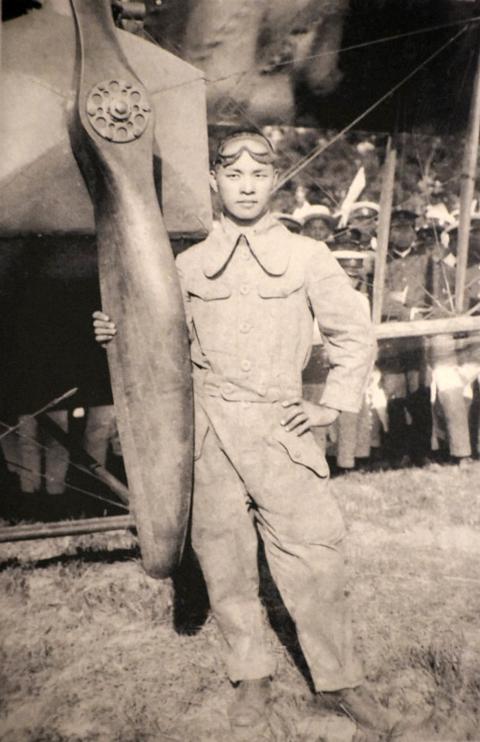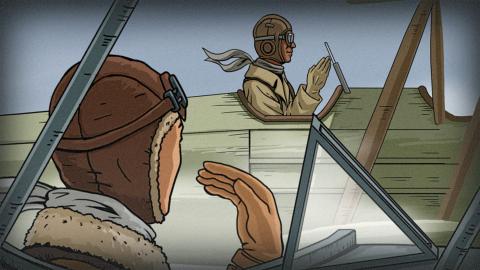For historical documentaries with little existing footage, Searching for the 1920s (尋找1920) is probably as exciting as it’s going to get. It’s not that the history is boring — protagonist Hsieh Wen-ta (謝文達), Taiwan’s first pilot, lived a fascinating life that could very much warrant a action-drama feature film. But when presented in documentary form, it becomes a niche production that will delight history buffs but doesn’t exactly fit the bill as mass entertainment.
Unlike the stage play A Suitcase of Memories (時光手箱), producer Khan Lee’s (李崗) previous project, Searching for the 1920s is educational, which is understandably why it won’t be hitting the theaters. Instead, the film — along with a second documentary featuring Korea’s first pilot An Chang-nam, who trained with Hsieh — will be shown at special screenings with accompanying talks in Taipei over the next few weeks. Lee’s Image and Imagination Foundation for Culture and Arts is also raising funds to show the film at schools throughout Taiwan.
It’s disappointing that there are no English subtitles, however, since any promotion of Taiwan’s history to foreigners is a good thing for the country.

Photo courtesy of Image and Imagine Foundation for Culture and Arts
Also rooted in Taiwanese history, featuring the Yen family of Keelung (基隆顏家), A Suitcase of Memories, which drew rave reviews when it was performed to a sold-old show at Metropolitan Hall in March, not only drew from Yen family descendant Tae Hitoto’s deeply personal books about her parents’ turbulent marriage, but was also fortunate enough to have Hitoto playing herself on stage. That story had the ingredients to draw a general crowd, focusing more on family and identity, emotions and personal memories rather than historical accuracies. And it made much of the audience cry.
There are some parallels in the two productions, most notably the characters’ struggle with identity under Japanese rule. Born in 1901, Hsieh became the first Taiwanese pilot, a model colonial subject with a bright future. But he soon became involved with Chiang Wei-shui’s (蔣渭水) passive resistance movement, leading to a daring exploit that saw Hsieh fly his plane directly to the colonial empire’s heart of Tokyo and drop about 20,000 leaflets with messages such as “Taiwanese have long been suffering under tyrannical rule,” and “The totalitarianism of the colonial government is a disgrace to the constitutional country of Japan!” He then fled to China rather than face the consequences.
However, the rest of Hsieh’s story remained relatively unknown until 2016 when his son Hsieh Tung-han (謝東漢),who is featured quite a bit in the documentary, published a two-part biography on his father, Wandering Between Two Motherlands (徘徊於兩個祖國之間).

Photo courtesy of Image and Imagine Foundation for Culture and Arts
The younger Hsieh was present at the documentary’s premiere earlier this month, presenting to Lee a framed replica of his father’s calligraphy, reading feixing (飛行, flight).
The film took three years to make, and the attention to detail is evident. Instead of just old photographs, newspapers and talking heads, many of Hsieh’s action sequences are presented in animation form, in a semi-realistic, down-to-earth manner that makes use of graphic elements for a strong visual experience. Since a big portion of the information is found in old newspapers and letters, the pieces of paper are shown on screen while a red line highlights the portion that’s being narrated. The Chinese-language articles could have just been read in Mandarin without anyone complaining, but instead they were read in Hoklo (also known as Taiwanese) to reflect historical accuracy because few people in Taiwan at the time spoke Mandarin. It’s interesting to hear since long passages of written Hoklo isn’t read aloud often.
The pacing gets a bit bogged down in the latter half especially since Hsieh’s most famous stunt took place early in his career at age 22, but overall it presents a complete and informative picture of Hsieh’s life and the times he lived in. History is fascinating not because of cold hard facts but the humanity behind each person’s decisions, and this documentary does its best to present Hsieh as a person, which will likely prove more interesting in the classroom than the usual educational video that will leave students snoring.

Photo: Pan Shao-tang, Taipei Times
Now that a factual visual record of the story has been completed, hopefully someone will turn it into a feature film and bring Hsieh’s tale to a wider audience. As the crowds flocked to watch Avengers: Endgame, which had showings every 10 minutes at most large theaters, it’s easy to forget that Taiwan had its own real life superheroes.

On April 26, The Lancet published a letter from two doctors at Taichung-based China Medical University Hospital (CMUH) warning that “Taiwan’s Health Care System is on the Brink of Collapse.” The authors said that “Years of policy inaction and mismanagement of resources have led to the National Health Insurance system operating under unsustainable conditions.” The pushback was immediate. Errors in the paper were quickly identified and publicized, to discredit the authors (the hospital apologized). CNA reported that CMUH said the letter described Taiwan in 2021 as having 62 nurses per 10,000 people, when the correct number was 78 nurses per 10,000

As we live longer, our risk of cognitive impairment is increasing. How can we delay the onset of symptoms? Do we have to give up every indulgence or can small changes make a difference? We asked neurologists for tips on how to keep our brains healthy for life. TAKE CARE OF YOUR HEALTH “All of the sensible things that apply to bodily health apply to brain health,” says Suzanne O’Sullivan, a consultant in neurology at the National Hospital for Neurology and Neurosurgery in London, and the author of The Age of Diagnosis. “When you’re 20, you can get away with absolute

May 5 to May 11 What started out as friction between Taiwanese students at Taichung First High School and a Japanese head cook escalated dramatically over the first two weeks of May 1927. It began on April 30 when the cook’s wife knew that lotus starch used in that night’s dinner had rat feces in it, but failed to inform staff until the meal was already prepared. The students believed that her silence was intentional, and filed a complaint. The school’s Japanese administrators sided with the cook’s family, dismissing the students as troublemakers and clamping down on their freedoms — with

As Donald Trump’s executive order in March led to the shuttering of Voice of America (VOA) — the global broadcaster whose roots date back to the fight against Nazi propaganda — he quickly attracted support from figures not used to aligning themselves with any US administration. Trump had ordered the US Agency for Global Media, the federal agency that funds VOA and other groups promoting independent journalism overseas, to be “eliminated to the maximum extent consistent with applicable law.” The decision suddenly halted programming in 49 languages to more than 425 million people. In Moscow, Margarita Simonyan, the hardline editor-in-chief of the